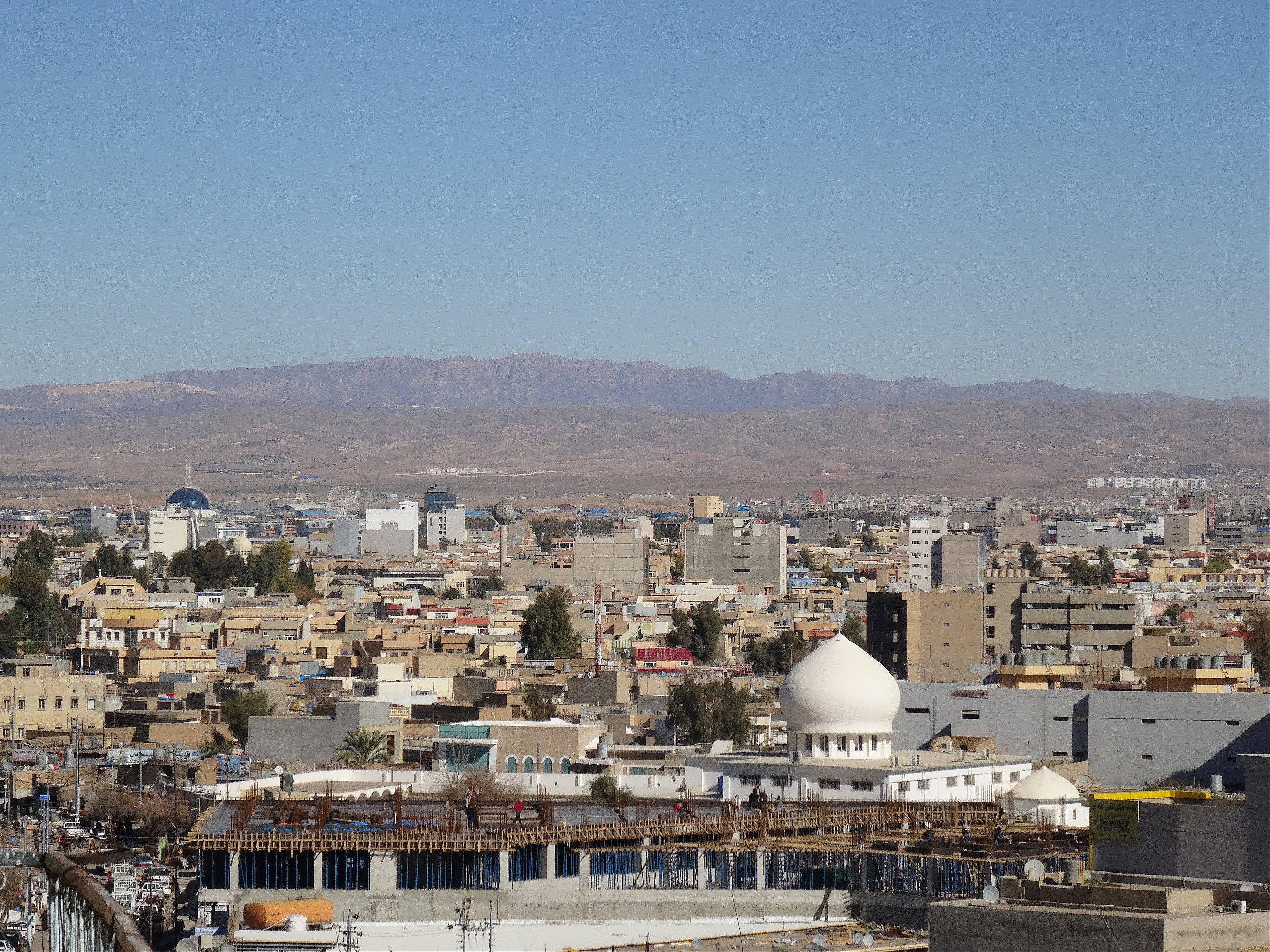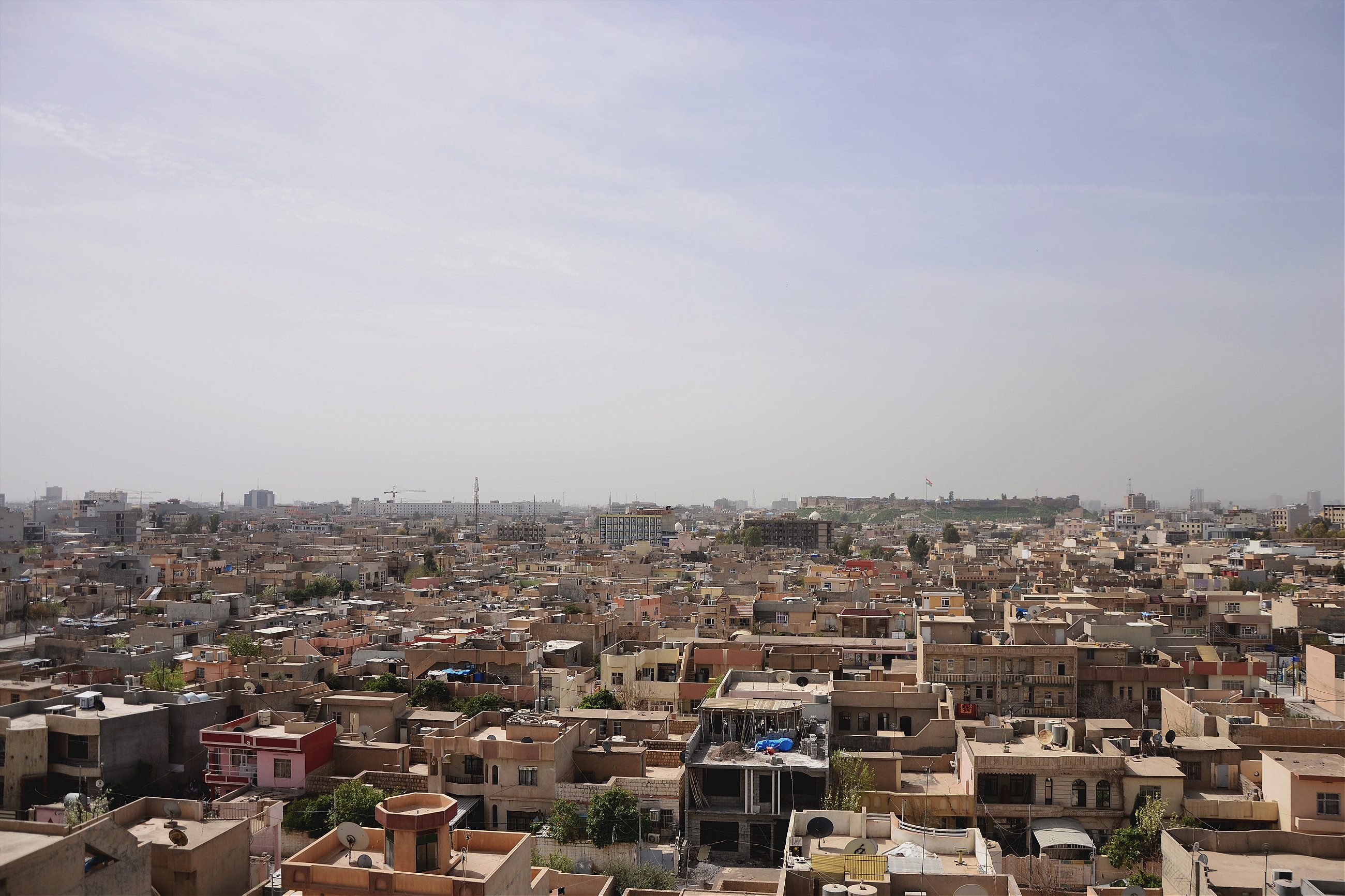Hospitality near the front lines in Iraqi Kurdistan.
When we pulled up in front of a nondescript building on the outskirts of Erbil, the driver asked incredulously, “Here!?” I nodded. We had driven to the edge of the city, turning at odd landmarks, guided by directions I vaguely remembered from a previous visit. It was 7 a.m. and already uncomfortably warm.
It was August 2014 and I had just arrived in the capital of the Kurdistan region in northern Iraq to report on current events. The Islamic State had advanced far into Kurdish territory all summer long and the situation was tense. I had flown in on one of the few remaining connections out of Istanbul and was now looking for my couch surfing host.
Founded in 2004, the website CouchSurfing.org connects travelers all over the world with hosts offering a place to sleep and the chance to meet likeminded people. Today, there are more than 10 million members in over 200,000 cities—even in such unlikely locales as Afghanistan and Iraq. However, there’s more to couch surfing in these regions than adventure travel; it is above all an immersive experience in local politics and culture. For me, a graduate student and fledgling journalist, it made reporting possible with a free place to sleep and helpful connections.
For the decade leading up to the summer of 2014, Iraqi Kurdistan had enjoyed relative peace compared to the rest of the country. Saddam Hussein’s fall was a blessing for the Kurds, who had long suffered under his regime. Since then, they have carved out a political niche for themselves in the fragile fabric of the Iraqi state. Bordering Syria, Turkey, and Iran, the region is somewhat independent from the central government in Baghdad. The Kurdish government has been vocal about its plans for independence, though independent statehoods remains a distant possibility. In Erbil, a city of 1.6 million people, one can hardly find any visible acknowledgements of the central government. From the flags to the police and ministries, everything is proudly Kurdish.

In the past, the region has attracted intrepid travelers, often looking to chalk up a visit to Iraqi territory to their “been there, done that” list. As Ryan McCarthy, a couch surfer originally from the U.S. who previously hosted visitors in Erbil, points out, “I think that’s a theme of all the travelers I encountered in Kurdistan. You have to be a little crazy to want to spend your holiday in Kurdistan.” At any rate, “The Other Iraq,” as savvy tourism entrepreneurs have tried to brand it, isn’t exactly a top destination for international travel.
The Kurdish government has tried to change that. In the late 2000s, the regional government issued ambitious plans to develop tourism in Kurdistan, in an attempt to harness the potential of its archaeological sites and breathtaking landscapes. But security concerns have mounted in recent years and tourism numbers have plummeted. Currently, the U.S. Department of State advises against all but essential travel to Iraq, including the Kurdish region. The United Kingdom’s Foreign Office takes a similar stance. Despite this, message boards and references left on couch surfing profiles indicate that visitors have been defying these warnings. There still is independent travel to the region.
Despite its expansion worldwide, couch surfing is not common in Kurdistan. According to Ali, a 28-year-old Kurdish couch surfer from Erbil, few locals know about the site, and if they do, it’s mostly younger people. Looking for couches during my first visit in 2013 indeed proved a challenge. There were few profiles registered in Erbil. The language barrier was an additional obstacle, as most local members spoke little English and I don’t know Kurdish. Other profiles weren’t completed and many appeared to have been abandoned. After some searching, however, I found a host: Ryan McCarthy. Since then, the site seems to have become more popular. Now, there are over 750 profiles listed in the Erbil area, and several hundred more in smaller cities such as Sulaymaniyah and Dohuk, but not all of them appear to be active.
Erbil had aspirations of evolving into the next Dubai.
Expats like McCarthy make up part of the couch surfing community in Kurdistan. He knew about the site before he came to Erbil and used the website while he worked as an English teacher there. Initially, McCarthy explored the website out of curiosity. He wanted to know whether anyone was there and was surprised to find a few people, but no active users. “And I am not going to lie, I did feel a little bad ass listing my place of residence as Iraq,” he says with a laugh. In Erbil, as in other places, spending time with couch surfers meant dinners, drinks, group meetings, and weekend excursions. McCarthy hosted travelers usually going to or coming from Iran, like me, but as work and his personal life picked up, he stopped hosting.
Erbil became something of a boomtown, with aspirations of evolving into the next Dubai. The city’s energy was palpable. During my visits I witnessed and overheard deals being discussed in a glitzy hotel and got drawn into an uncomfortable conversation about the business of war. On the city outskirts, construction projects and a modest skyscraper reflected the region’s economic aspirations. Shopping malls lured customers with polished floors and gleaming stores. The Kurdish capital is home to consulates, aid offices, and international companies, providing for a presence of international expats in the city.
However, walking along the streets in the city center, it became apparent that Western visitors are a rare sight in Erbil. Passersby inquired curiously about the circumstances of my visit. Younger ones often whipped out their phones and showed me photos of their friends and family and celebrities they liked, beckoning me to do the same. Ali is on the site out of a similar curiosity. For him, couch surfing is a means to discover the world, even as his Iraqi passport makes traveling abroad difficult. “When I read about couch surfing and what the idea is, I just fell in love with it,” he says. “I met the first couch surfer after a week.”

During one visit, I spoke with three male Kurdish teachers about couch surfing. The concept appealed to them: Meeting people from elsewhere when they couldn’t travel themselves was better than nothing. Yet, they were unsure about the idea of a single female staying at their shared house.
The region’s dynamic economy attracts Iranians as well, some of whom can be found on the site. Shayda is one of them, a 23-year-old who moved to Erbil with her fiancé, who found work in the city. Unable to speak Kurdish or Arabic, Shayda struggled to find a job. She spent much of her time alone at home and found it difficult to make friends, so she turned to couch surfing to meet new people. She’s since befriended Pakistani and Iranian couch surfers. For other Iranians, the region has become a place of refuge. A couple I met through couch surfing left Iran because of political pressure after they were involved in anti-government protests. They hope their stay in Kurdistan will be a stepping-stone for seeking political asylum elsewhere.
When I first traveled to Iraqi Kurdistan in 2013, I went there out of curiosity as a tourist. In 2014, I returned to Erbil for work during the height of the Islamic State’s assault on Kurdish territory. Couch surfing was helpful during both of my stays, but for different reasons. During my first visit, I wanted to learn more about the region; during my second, I wanted to report on it. The connections I made through the site were indispensable. With editorial rates being what they are, the hospitality of my hosts and their friends made the possibility of freelancing a reality. Couch surfing offered everything I needed as a young journalist: Local connections, a place to type out my notes, and, most importantly, a free couch to sleep on.